by Lisa Cooke | Oct 26, 2016 | 01 What's New, Amish & Mennonite |
Anabaptist genealogy records include Amish, German Baptist and Mennonite ancestors. In a past post titled “Amish Genealogy Revealed,” we shared tips for searching out your Amish family tree. Here are more helpful resources submitted by our wonderful readers that you won’t want to miss.
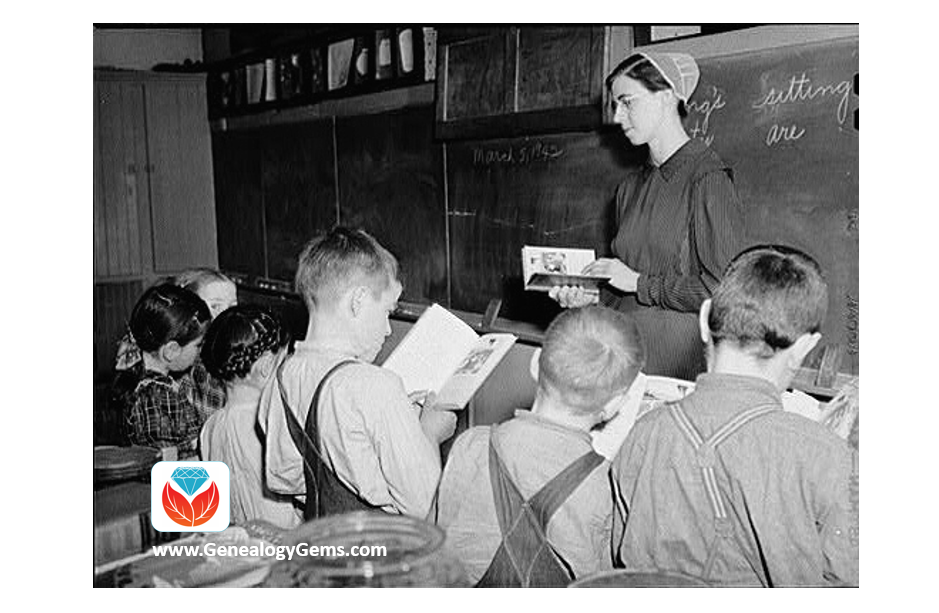
What is an Anabaptist?
The term Anabaptist refers to those religions who reject infant baptism in favor of a believer’s baptism. Amish, Mennonite, and German Baptists fall into the category of Anabaptists.
Anabaptist religions often subscribe to more conservative views and dress. Their families are very much intertwined with their religion, making the study of their history rich in detail and customs.
Anabaptist Genealogy Records: More Amish and Mennonite Family History Resources
We shared in our “Amish Genealogy Revealed,” the resources of the Amish newspaper, The Budget, the Amish church directories, and newsletters and books on Amish families. Many thanks to reader Loren Johns for sharing yet another amazing resource. Loren shared:
As someone who has a couple of hundred thousand Amish in my genealogical database, I enjoyed reading your focus on Amish genealogy. Somewhat surprised to see it!
You did not mention the
most important source for Amish genealogy. It is the
Swiss Anabaptist Genealogical Association, of which I am the secretary. This is a rather informal non-profit association of amateur genealogists interested in Amish and Mennonite genealogy who share their research with each other and with others interested in it, and make it available online.
Further, Mr. Johns shares that the Swiss Anabaptist Genealogical Association (SAGA) maintains a large database of un-merged databases that can be searched simultaneously. He gives an example:
If I search for an Amos J. Whetstone (an Amish name,) I get 17 hits, to three separate men. Amos J. Whetstone (1903-1984) appears in 6 different databases; Amos J. Whetstone (1919-2003) appears in 4 databases; and Amos J. Whetstone (1945- ) appears in 7 databases … so the 17 hits actually represent three men.
This amazing SAGA database contains over 5,000,000 names, though many of those are duplicates. You can imagine the value of such a large database for this specific group. If you are interested in joining SAGA and gaining access to the database, see the membership page
here.
Lastly, Mr. Johns leaves us with this fine tip!
A most important book on Amish genealogy is Amish and Amish Mennonite Genealogies by Hugh Gingerich and Rachel Kreider. It is sometimes called the Amish genealogy “Bible.” It traces all of the Amish immigrant ancestors (144 different surnames) and their families to 1850, where it had to stop lest it explode into an encyclopedia.
Anabaptist Genealogy Records: Resources for the German Baptist or The Old German Baptist Brethren
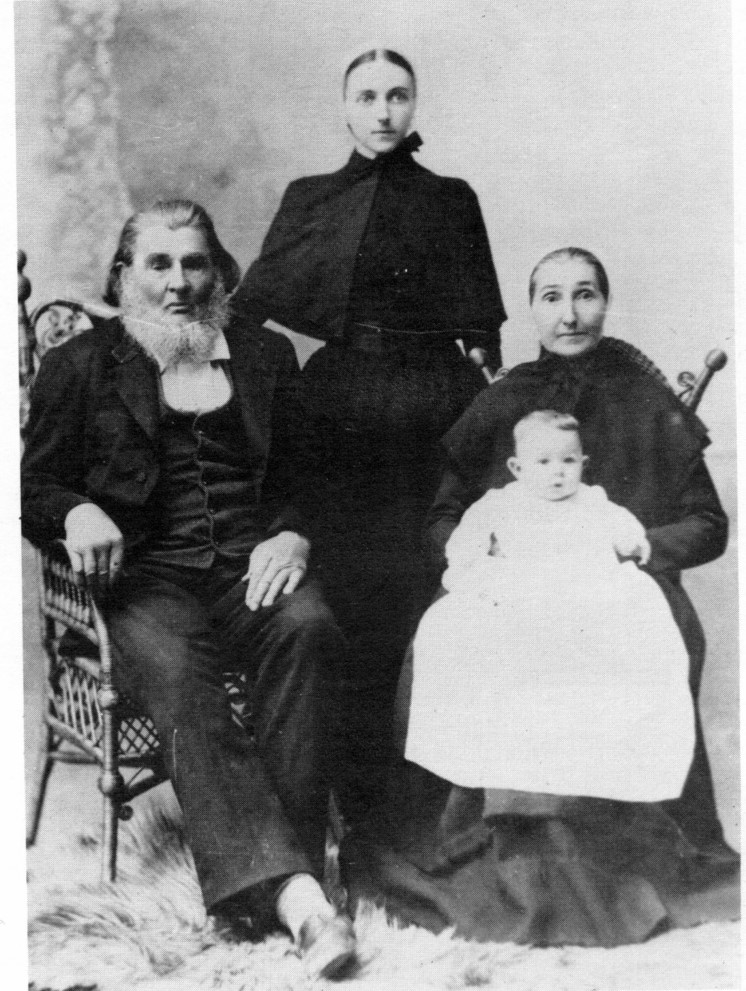
George Funderburg and family were members of the German Baptist faith.
Another group of Anabaptist’s are the German Baptist, also known as the Old German Baptist Brethren. Here in Ohio, we sometimes refer a particular break-off by their nickname, Dunkards. The Dunkards were given this nickname for their belief in baptism by immersion.
It is my own family ancestors who were among the Dunkards. Luckily, we have a wonderful archive in Brookville, Ohio called Brethren Heritage Center. The Brethren bodies involved with the Brethren Heritage Center are:
- Church of the Brethren
- Conservative Grace Brethren International
- Dunkard Brethren
- Fellowship of Grace Brethren Churches
- German Baptist Brethren
- Old Brethren
- Old Brethren German Baptist
- Old German Baptist Brethren
- Old German Baptist Brethren-New Conference
- Old Order German Baptist
- The Brethren Church
This heritage center offers many books and collections including family histories, maps, letters, diaries, census records, and birth records. In particular, the heritage center website also has a large list of helpful links to begin researching your Brethren ancestors. To see the list of links, click here.
Anabaptist Genealogy Records – Share Your Knowledge
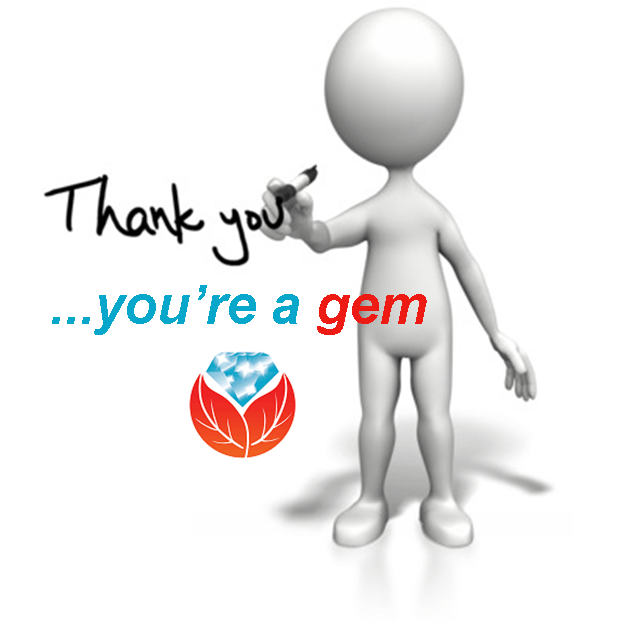 If you have Anabaptist heritage, you may be aware of additional Anabaptist genealogy records that we have not mentioned. We would be delighted if you would share that information with our Genealogy Gems community in the comments below. We look to you to be an inspiration and teacher to us here at The Genealogy Gems Podcast, and you always come through. Thank you!
If you have Anabaptist heritage, you may be aware of additional Anabaptist genealogy records that we have not mentioned. We would be delighted if you would share that information with our Genealogy Gems community in the comments below. We look to you to be an inspiration and teacher to us here at The Genealogy Gems Podcast, and you always come through. Thank you!
by Lisa Cooke | Jan 14, 2017 | 01 What's New, Newspaper
Newspapers can fill in the gaps to the long-lost stories of your ancestors. These tips will help you narrow your search in digitized WWII newspapers for experiences directly relating to the war and to the lives of your ancestors.

In this previous post, I provided step-by-step tips for locating WWII-era newspapers. Those tips helped you locate the actual newspapers. In this post, I’ve got 7 tips for to help you focus on narrowing down a large list of results in search of war-related family stories.
Tip 1: Try Various Name Combinations in WWII Newpapers
If you are keyword searching in digitized newspapers, remember to try different name combinations. A man may be identified by just his first initial and last name. During the 1940s, a woman might be referred to as “Mrs. Ted Johnson” instead of Barbara Johnson.
Tip 2: Search for Addresses
You might find a family identified as “the Johnson’s of 132 Cherry Lane,” so try using street addresses in your searches, remembering that “Lane” might be spelled out or abbreviated. You may also find the family listed by their town or township. An example of this might be “the Johnson’s of Brown township,” or “the Johnson’s of Conover.”
Tip 3: Expand Your Search to Events and Organizations
Use any search terms you already know about for your family in World War II: a military unit, a battle or local service organization, or a war effort project that the folks back home may have helped out with. Do family stories mention rationing, air raid drills, bomb shelters, blackout rules, or one of the women getting a job at a certain factory? All these make excellent search terms.
Tip 4: Take Time to Browse
Browsing the pages will give you a sense of how the war affected everyday life at home. You may find recipes that make the most of ration allowances and reminders about blackout rules and curfews. You may even find tips on how to conserve gasoline or how to be fashionable without silk stockings!
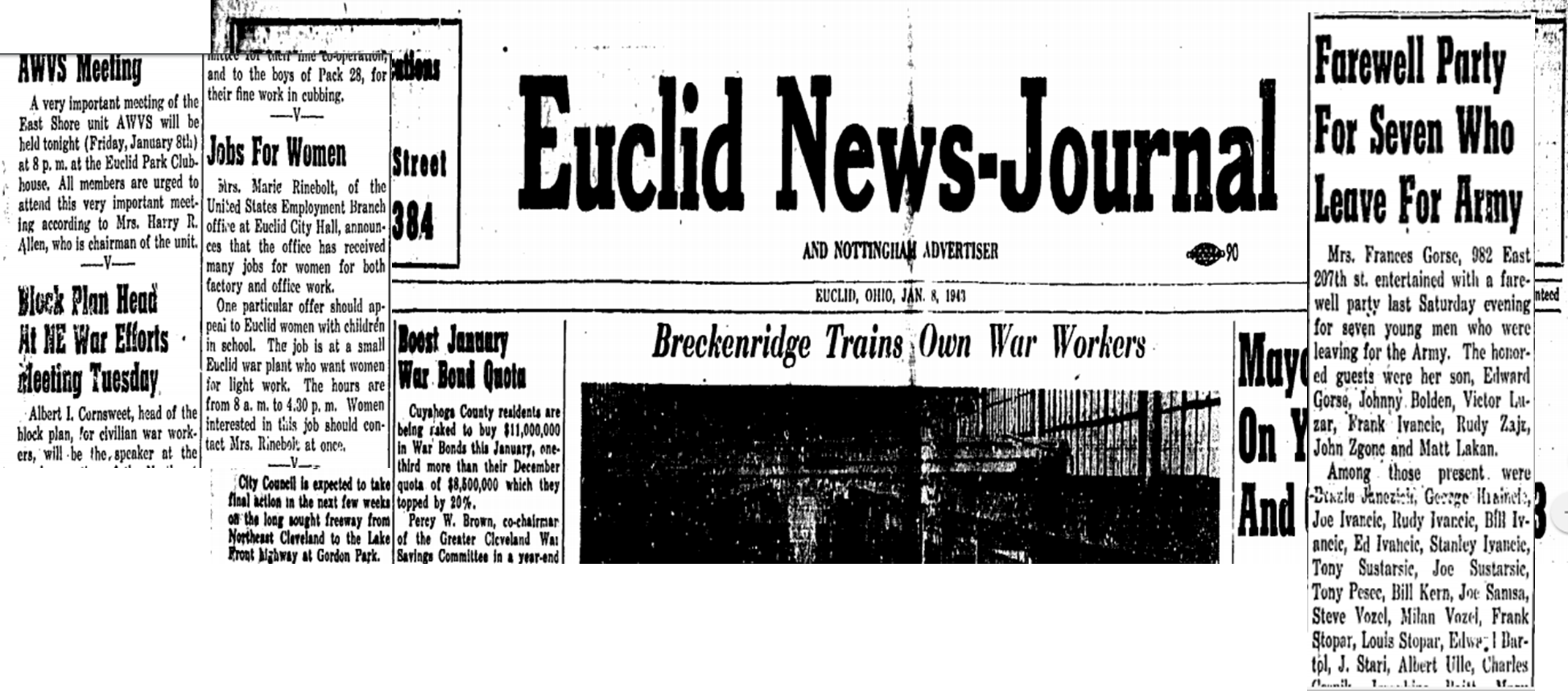
Almost every news item on the front page of this Jan 8, 1943 issue of the Euclid News Journal (OH) has to do with the war. It’s easy to see how the war affected everyday life of this small Ohio city on the shores of Lake Erie. Issues of this paper are searchable at the Euclid Public Library website (click image to view more issues.)
Tip 5: Be Aware of Newspaper Stoppages
If your family lived in an area that came under attack or was occupied, the local newspapers may have stopped printing. In that case, search other papers to see if they reported what was going on in your ancestor’s town.
Tip 6: Keep an Eye on the Homefront
For relatives who served in the military, watch for updates in local papers about how they were faring on the fronts during the war. Watch for casualty lists of the wounded, dead, and missing. Here’s something cool: newspapers also printed maps showing the progress of the war on the various fronts.
Tip 7: History Provides Hints
If you’re looking for reports about soldiers’ bodies returning home and funeral services, it will help to know that according to an article in The Wall Street Journal, the War Department didn’t start bringing back remains until the fall of 1947 because of the huge logistical challenges involved. Over 93,000 American soldiers who died in World War II are buried overseas in one of the American Battle Monuments Commission cemeteries.
Making the Most of Newspapers for Family History
 Find more tips like these in my book, How to Find Your Family History in Newspapers. You’ll find step-by-step instructions for my foolproof research process, along with everything you need for success: worksheets and checklists, tons of free online resources (and websites worth paying a few bucks for), a massive amount of location-specific websites (U.S. and international)–and a case study that puts it all to the test!
Find more tips like these in my book, How to Find Your Family History in Newspapers. You’ll find step-by-step instructions for my foolproof research process, along with everything you need for success: worksheets and checklists, tons of free online resources (and websites worth paying a few bucks for), a massive amount of location-specific websites (U.S. and international)–and a case study that puts it all to the test!
by Lisa Cooke | Dec 18, 2015 | 01 What's New, Records & databases
Here’s our weekly roundup of new genealogy records online that caught our eye. This week there are a lot of US records: Alabama Episcopal church registers, Connecticut sourt records, Kansas probate records and New York Evening Post death notices. Immigration records for Brazil and Italian civil registrations are also on the list!
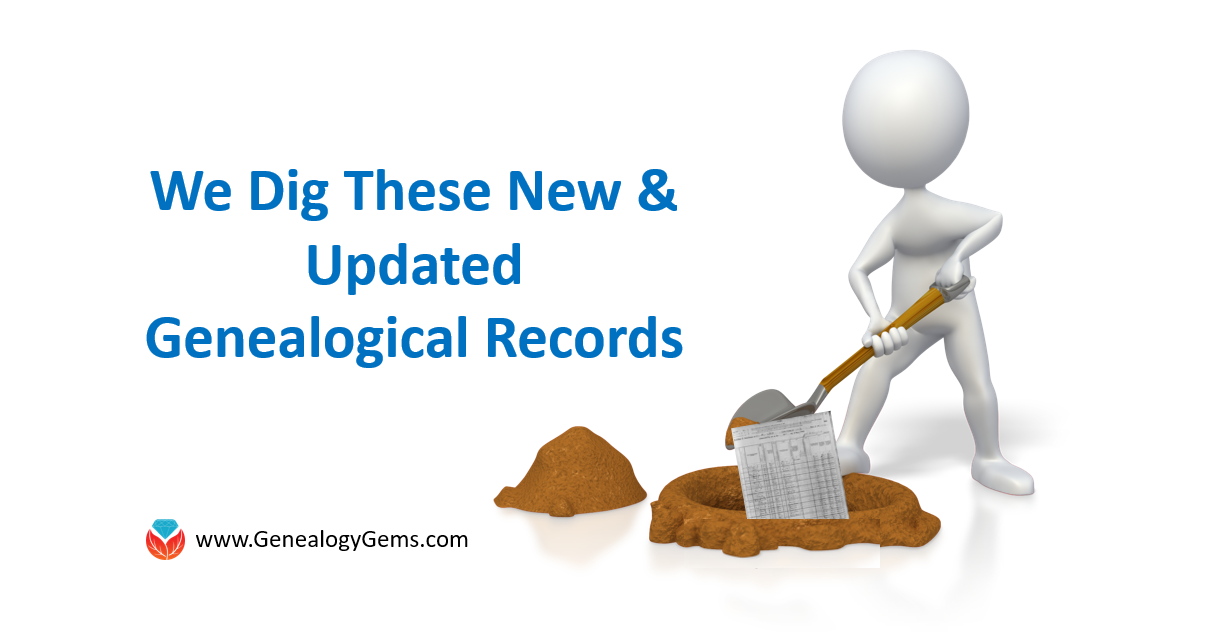
ALABAMA CHURCH. The Birmingham Public Library’s index to Alabama Episcopal Church registers (1832-1972) is now also searchable on Ancestry as a Web Index (click here to learn about Ancestry Web Indexes). The index includes “confirmations, baptisms, marriages and burials for more than 14,000 people in sixteen Alabama parishes for the period of the 1830s to the 1970s.”
(click here to learn about Ancestry Web Indexes). The index includes “confirmations, baptisms, marriages and burials for more than 14,000 people in sixteen Alabama parishes for the period of the 1830s to the 1970s.”
BRAZIL IMMIGRATION. Over 2.2 million indexed records have been added to a free FamilySearch collection of Brazil Rio de Janeiro Immigration Cards (1900-1965). These records, in Portuguese, “contains immigration cards issued by Brazilian buy tapeworm medication dogs consulates around the world. These cards were then presented at the port of entry by foreigners visiting or immigrating to Brazil through the port of Rio de Janeiro from 1900-1965.”
CONNECTICUT COURT. Over a quarter million indexed records have been added to FamilySearch’s free index to Connecticut District Court naturalizations (1851-1992)
ITALY CIVIL REGISTRATION. Nearly a quarter million indexed records have been added to FamilySearch’s free collection of Italian civil registrations for Taranto, 1809-1926.
KANSAS PROBATE. Ancestry’s collection of Kansas wills and probate records has been freshly updated. Kansas wills and probate records The current database covers nearly two centuries (1803-1987) and covers at least some time periods in nearly half of Kansas’ 105 counties.
The current database covers nearly two centuries (1803-1987) and covers at least some time periods in nearly half of Kansas’ 105 counties.
NEW YORK DEATHS. An index to over 100,000 death notices from the New York Evening Post (1801-1890) is now available to subscribers at AmericanAncestors.org. “Page images and an index searchable by first and last name, location, and year are included.”
 Merry Christmas and Happy New Year!
Merry Christmas and Happy New Year!
Disclosure: This article contains affiliate links and Genealogy Gems will be compensated if you make a purchase after clicking on these links (at no additional cost to you). Thank you for supporting Genealogy Gems!
by Lisa Cooke | Aug 6, 2018 | 01 What's New
Join me for a peek inside this speaker’s life. Last week I was in Provo, Utah for the BYU Conference on Family History & Genealogy, with production assistant (and awesome daughter!) Hannah by my side. It was a full week of teaching (6 sessions),...


 If you have Anabaptist heritage, you may be aware of additional Anabaptist genealogy records that we have not mentioned. We would be delighted if you would share that information with our Genealogy Gems community in the comments below. We look to you to be an inspiration and teacher to us here at The Genealogy Gems Podcast, and you always come through. Thank you!
If you have Anabaptist heritage, you may be aware of additional Anabaptist genealogy records that we have not mentioned. We would be delighted if you would share that information with our Genealogy Gems community in the comments below. We look to you to be an inspiration and teacher to us here at The Genealogy Gems Podcast, and you always come through. Thank you!




 Merry Christmas and Happy New Year!
Merry Christmas and Happy New Year!